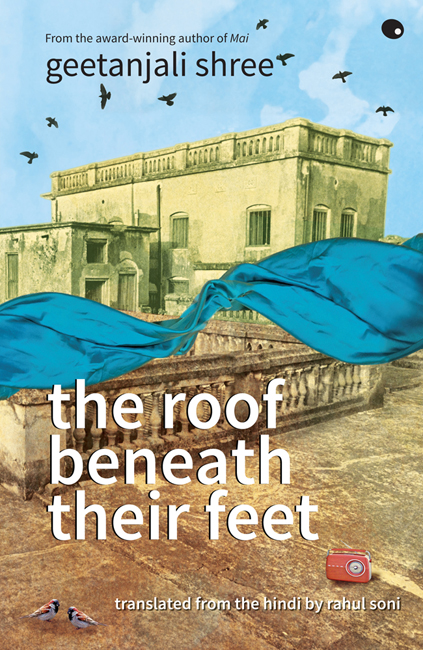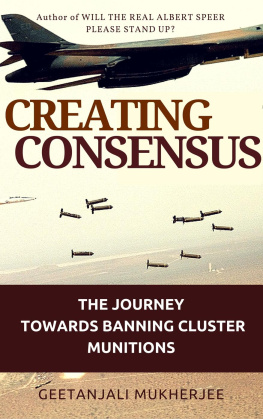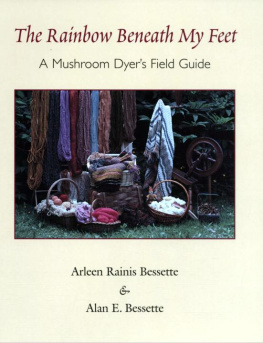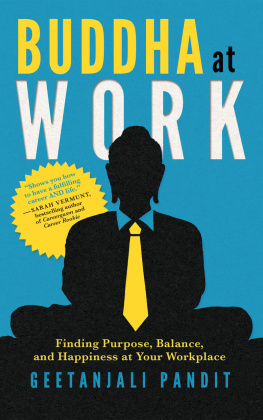Geetanjali Shree - The Roof Beneath Their Feet
Here you can read online Geetanjali Shree - The Roof Beneath Their Feet full text of the book (entire story) in english for free. Download pdf and epub, get meaning, cover and reviews about this ebook. year: 2013, publisher: HarperPerennial, genre: Art. Description of the work, (preface) as well as reviews are available. Best literature library LitArk.com created for fans of good reading and offers a wide selection of genres:
Romance novel
Science fiction
Adventure
Detective
Science
History
Home and family
Prose
Art
Politics
Computer
Non-fiction
Religion
Business
Children
Humor
Choose a favorite category and find really read worthwhile books. Enjoy immersion in the world of imagination, feel the emotions of the characters or learn something new for yourself, make an fascinating discovery.

- Book:The Roof Beneath Their Feet
- Author:
- Publisher:HarperPerennial
- Genre:
- Year:2013
- Rating:3 / 5
- Favourites:Add to favourites
- Your mark:
- 60
- 1
- 2
- 3
- 4
- 5
The Roof Beneath Their Feet: summary, description and annotation
We offer to read an annotation, description, summary or preface (depends on what the author of the book "The Roof Beneath Their Feet" wrote himself). If you haven't found the necessary information about the book — write in the comments, we will try to find it.
The Roof Beneath Their Feet — read online for free the complete book (whole text) full work
Below is the text of the book, divided by pages. System saving the place of the last page read, allows you to conveniently read the book "The Roof Beneath Their Feet" online for free, without having to search again every time where you left off. Put a bookmark, and you can go to the page where you finished reading at any time.
Font size:
Interval:
Bookmark:

The Roof Beneath
Their Feet
Geetanjali Shree
Translated from the Hindi by
Rahul Soni

NEW YORK LONDON TORONTO SYDNEY NEW DELHI AUCKLAND
Contents
W alls have ears, but alas they cant speak the people living under this roof lamented or they would have told such stories about the secret goings-on of the mohalla! So telling stories now fell to people who, unlike walls, had too much tongue and not enough ears. And eyes, still fewer. But because they could speak, such failings didnt matter; stories were created, stories were told. They even started coming true! They echoed in the wind that swept the rooftops, and could be seen through the kaleidoscopic cobwebs in the skylight.
And was it not on this very rooftop where it all began? Where the children of the mohalla played, copycatting one another, and bounding from the reproofs of adults. Shouting times for no reason, they would run to the skylight to peep, and start giggling nervously. I, too, would run with them to peep into the room, and the older children would pull at my shorts and threaten,
Tell us
Did you see what we just saw?
Wham bam, wham bam going on!
Clutching at my shorts, I would shout,
Yes, I saw what you just saw!
Wham bam, wham bam going on!
And with the wham bam, wham bam, Id rock my head from side to side, which would make them laugh, and I would laugh with them and return to throwing pebbles and hopping on one leg.
The older children wouldnt return to playing after they had peeped, though. The ancient, grimy, cracked skylight was like a magical glass, filtered through which, stories turned into swings that the adults would then ride higher and higher on the rooftop, adding their inflamed whispers to the wind that swept through the mohalla.
Did you see? they asked. Even the children have seen! And children dont lie, do they? Theyre pure of heart, arent they? So theyd build walls around what they wanted to believe. When they looked down the skylight, didnt they see Uncle and Lalna sleeping in the big room, and poor Chachcho sleeping alone in the room by the porch?
Was it possible? I wondered, trying to remember the two rooms near the porch, neither of which could be seen from the skylight. One of them was the library. The other was the storeroom, stuffed with a world full of old and broken things to be sold as scrap or to be given away to servants. An old daybook, notebooks from school, the broken recliner which, with a newspaper under it, had served as a commode by Uncles bed in the early stages of his sickness, boxes, bottles, tin cans, pens that didnt work, an old fridge crammed with burlap bags, a cage, a rattrap, a tattered holdall, the new brass pichkari bought on Holi, which looked very grand, but was useless when it came to squirting colour it shot out a thin trickle and was, therefore, soon relegated to a corner of the store, away from festivities some rope, a trowel, a broken pot and a leaking pitcher. All the children of the mohalla wanted to hide in the storeroom while playing hide and seek, but hiding there meant getting an earful from Lalna and a smacking from their parents.
I felt sad. Was it from remembering the storeroom? Or the books in the library?
So, there was a library? a lover asked me years later, suspicion in her eyes.
Yes.
Then where did it go? Did it fly away?
Yes. It flew away.
Wah! It had wings?
Yes. It had wings.
And it flew away overnight?
I didnt answer. Not overnight, but little by little, year by year, quietly. Once, someone brought back three books with Uncles name on them from the scrap market, Here, take them. Consider them your own!
So, my lover said, shrugging as if a point had been proved, there was no library. Just the room where poor Chachcho slept alone.
I remained silent.
And Lalna and Uncle, together.
Right, I said, tonelessly.
Even the kids saw it from the skylight! she snapped.
So did I, I told her.
So who slept with whom?
Uncle
?
With me.
In the flying library?
No. In the sitting room by the boundary wall.
And in the big room?
Chachcho. With Lalna.

Lalna.
That was not her name.
What her name was, no one knew.
When I asked her, having overheard the furtive whispers of people, Lalna, who was standing on a stool wiping the ceiling fan with a wet rag tied to a stick, shook so badly that it seemed she would fall, taking me and Chachcho down with her, along with the stool and the table upon which it stood and which we were trying to hold steady. Who told you? Who? It must have been that Paresh. Didnt I tell you to stay away from his sort? Behen-ji, why dont you stop him? The boy will be spoilt. Dont shake the stool! And she twirled the stick with the wet rag and hurled it at the floor, as if wanting to wipe not the dust off the fan but the curiosity off my face.
But her name wasnt Lalna.
What it was, no one knew. All they knew was that she had come crying one day to Premanand-jis house, and from then on people knew her as Lallans bahu.
But she wasnt Lallans bahu. At least not in the usual sense of bahu. She wasnt Lallans daughter-in-law she was his wife.
How is it possible that no one knew who Lallan was? the same lover asked me behind the tank on the roof. Here, they create people out of thin air. And youre telling me that a whole, hale human being disappeared?
But behind the tank on the roof, words echo differently. The words remain the same, but their meanings change. No one knows that you and I are here that we have disappeared from everyones sight Oh ho Ai hai!
Hale? Not at all, I said in a different sort of haste, caressing my lovers neck.
Was he mad?
Yes, yes, mad! I panted.
But I didnt know that. Chachcho said that Lalna had told her.
But Chachcho said that Lalna had also told her that Lallan was dead and that Lallans father had tried to force her into prostitution, which was why she ran away.
Ran away? Bah! my lover said. I heard that her father-in-law brought her here. She came wailing, and fell at her father-in-laws feet saying, dont do this bappa, dont leave me here bappa, your bahu will die bappa, and her nose started running as she cried and her father-in-law said, stay away, stay away, not to keep her hands away from his feet but to save his dhoti from her nose!
Why did she have to start on all this Lalna, Chachcho, Uncle now, behind the tank, when all my actions were trying to tell her, lets talk about me and you! Theres romance in the air, and theres you and me This weather, this moment, just us and no one else Idhar main jawaan udhar tum haseen My youth, your beauty The possibilities!
Who knows, my lovers eyes dropped as her imagination took flight, maybe it wasnt her father-in-law but Lallan himself who brought her here, to get rid of her so that he could go back to his new, second bride?
Yes she also told us that, I said breathlessly.
That Lallan brought her here? Her eyes grew wide.
No. That she was sick of his second wife so she ran away. But enough of that! I scolded.
Who knows where she had come from? All we knew was this: someone had come to leave her and shed cried and sniffled at his feet, but in the end, people said that Lalna had run away. Run away from Lallan, whom no one knew, not even where he was from. They didnt even care whether he existed or not. All they were interested in was Lalna the magnet to which all their curiosity had attached itself.
Next pageFont size:
Interval:
Bookmark:
Similar books «The Roof Beneath Their Feet»
Look at similar books to The Roof Beneath Their Feet. We have selected literature similar in name and meaning in the hope of providing readers with more options to find new, interesting, not yet read works.
Discussion, reviews of the book The Roof Beneath Their Feet and just readers' own opinions. Leave your comments, write what you think about the work, its meaning or the main characters. Specify what exactly you liked and what you didn't like, and why you think so.






